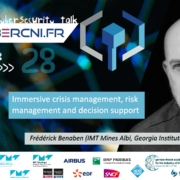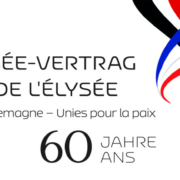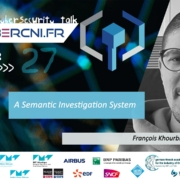[TALK28] Immersive crisis management, risk management and decision support – Frédérick Benaben (IMT Mines Albi, Georgia Institute of Technology)
On Wed, Feb 22nd, 2023, 2pm CET, Frédérick Benaben (IMT Albi, Georgia Institute of Technology), will talk about “Immersive crisis management, risk management and decision support“. You are cordially invited to join the free live stream on youtube and LinkedIn! Please share the link https://talk.cybercni.fr/28 with your interested friends!
Trailer: https://youtu.be/yBvXi66s4Ek
LinkedIN Event: https://www.linkedin.com/video/event/urn:li:ugcPost:7024139695294947328/
Facebook Event: https://www.facebook.com/events/1100517861345963/
Youtube: https://www.youtube.com/watch?v=ZvfdO_T2-ro&list=PLdftPKA9mTfaDJxqwexil2mPhUFIA9ITd
Stream redirect (for every edition): https://TALK.cyberCNI.fr/stream
Newsletter with invitations: Subscription on https://TALK.cyberCNI.fr
Help us spreading the news
The best talks are those with an interested diverse audience! Therefore, please use the following media to spread the news in your networks:
Thank you!
Abstract
This talk explores the groundbreaking perspectives opened by the original specificities of immersive technologies in the fields of crisis management, risk management and decision support: The interest and the potential of virtual reality for training in crisis situations (of responders and citizens) will first be presented. Then, the contributions of immersive technologies, in particular in terms of facilitating interactions with artificial intelligence tools, will be illustrated through virtual and immersive cells dedicated to crisis management. Finally, the power of immersive approaches for decision support in uncertain and unstable contexts will be addressed through a third and last demonstration. In the end, different application contexts, different modes of immersion, and different users will be presented in order to cover the broadest possible perspective of the maturity of the research activities and contributions of the SIReN Lab (Sentient Immersive Response Network) between the Centre Genie Industriel of IMT Mines Albi and the Physical Internet Center of Georgia Tech.
Frédérick BENABEN
Frederick BENABEN is Professor at the Industrial Engineering Center of IMT Mines Albi in charge of the research axis “Security and Crisis Management”. He is the director of the IOMEGA VR lab on immersive technology for system management. He is adjunct Professor at the School of Industrial and Systems Engineering of the Georgia Institute of Technology (USA) and co-director with Professor Benoit Montreuil of the international associated laboratory “Sentient Immersive Response Network” (SIReN Lab) between IMT Mines Albi CGI and Georgia Tech ISyE. He is affiliated professor at the 3C informatics research center of the College of Information Sciences and Technology of the Pennsylvania State University (USA).
He is adjunct professor at the School of Economics and Management, Beijing Jiaotong University (China).
Centre Génie Industriel IMT Mines-Albi / SIReN Lab Georgia Tech
The Centre Génie Industriel involves 70 people and is interested in the kinetics of organizations and the development of decision support solutions in heterogeneous, collaborative and uncertain contexts. The Centre Génie Industriel conducts applied research activities through collaborative projects based on public funding (regional, national and international) but more mainly on private funding in the form of joint industrial research laboratories in direct partnership with industrial players.
The SIReN Lab is an international shared reserach Lab between IMT Mines Albi and Georgia Tech. It is focused on the design of management and decision making environments (control tower, immersive dashboard) to deal with networks and systems immersed in unstablme and uncertain environment. The SIReN lab involves a dozen of researchers including shared PhD students, faculties and engineers.
Talk.cybercni.fr
The Cyber CNI Lecture Series is a free monthly event that typically takes place on the last Wednesday of the month from 2pm to 3h30pm CET.
The event consists of a 45-minute expert presentation followed by a 45-minute discussion.
The Cyber CNI Speaker series aims to raise awareness and understanding of cyber security issues among all audiences. It aims to enable an ongoing dialogue between experts from industry and academia and the general public (citizens, families, small and large businesses, public organizations, etc.). All of us are concerned.
The events are broadcast live on Youtube (https://talk.cybercni.fr/) and LinkedIn, allowing worldwide remote participation – including a tool to participate in the discussion.
You can add the event calendar via ICS, webcal, HTML.
How the digital transformation is changing our lives
The COVID-19 pandemic has shown all of us the benefits of information technology. It allows us to work at a distance, to live at a distance, and most importantly, to keep in touch at a distance – with younger and older people, those closest to us, and even make new contacts.
Our society relies more and more on information and operational technologies. Examples include water, energy, heat and cooling supply, communications, healthcare, production and processing of goods, transportation, national security, banking, research and education, and food production.
What all these areas have in common is that they make intensive use of networked distributed computer systems. These systems can be attacked in many ways. This is no longer just a problem for computer “pros” because computer systems are essential to all of us. The effects of “cyber-attacks” range from power outages to the collapse of the health care or banking sectors.
Program and registration: https://talk.cybercni.fr/





